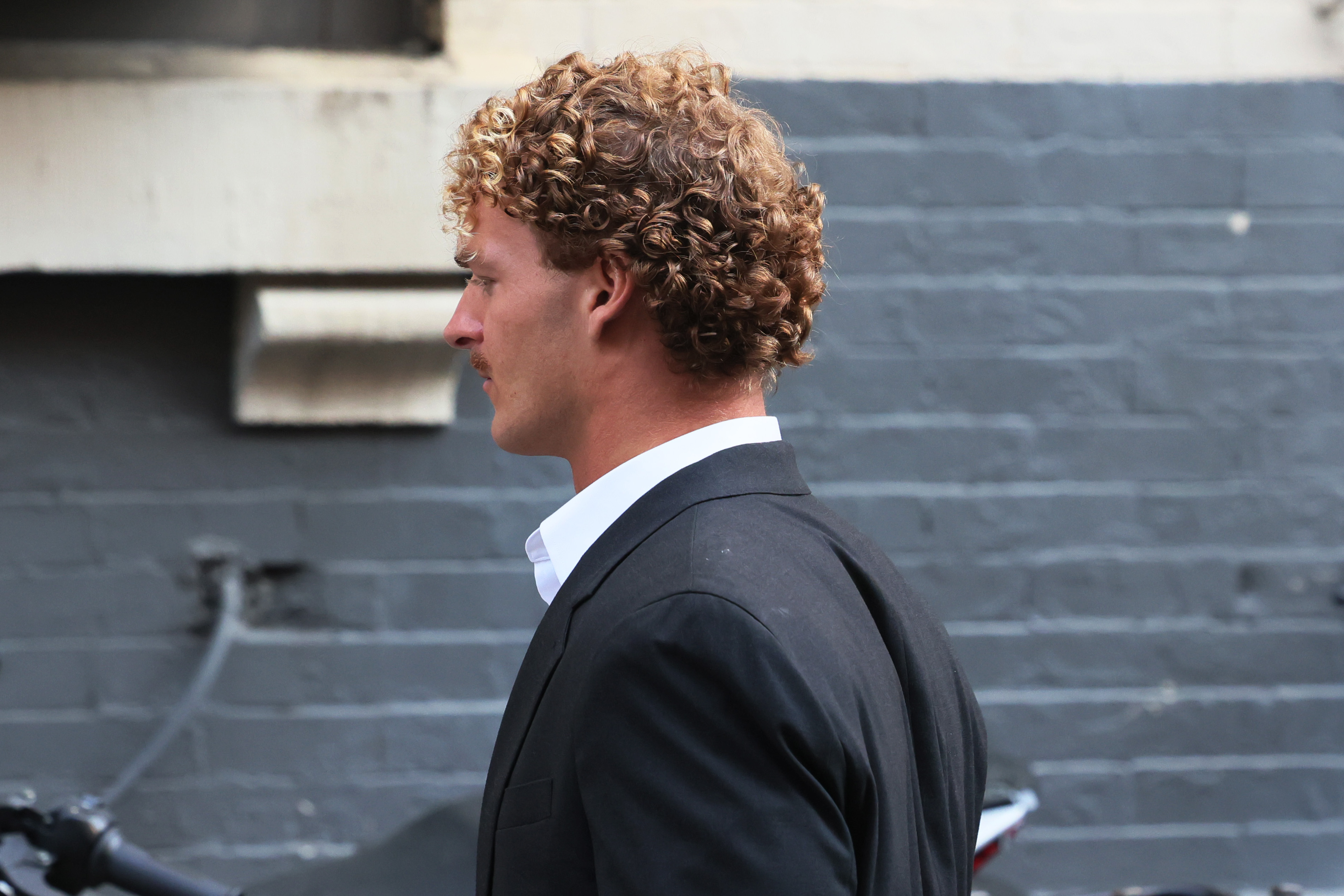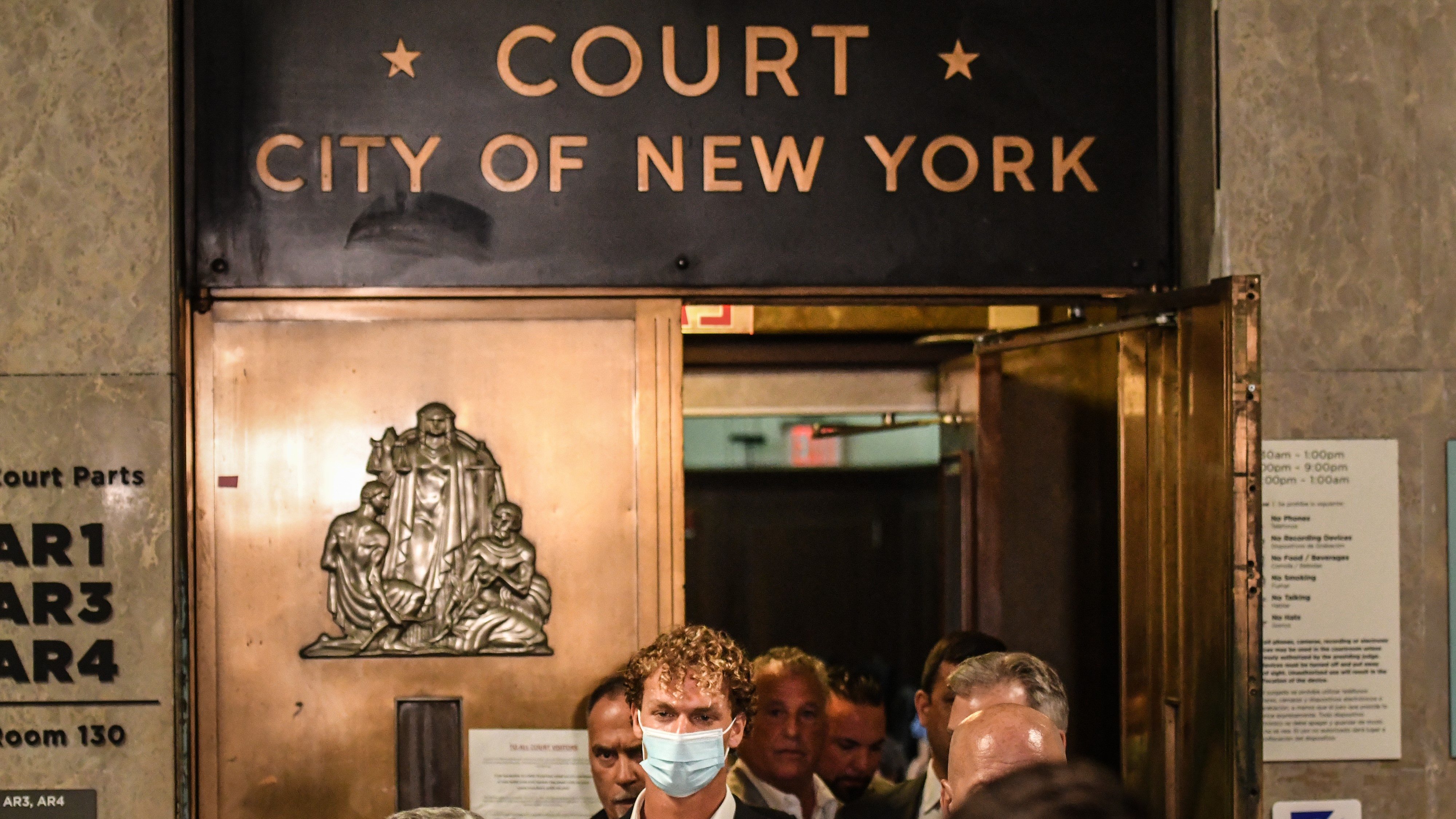What to Know
- 30-year-old Jordan Neely died on a train at the Broadway-Lafayette station in Manhattan on May 1 after allegedly threatening passengers and being put into a chokehold by a rider; that rider, identified as 24-year-old Daniel Penny, was questioned by the NYPD and later released from custody
- The medical examiner's office ruled Neely's death a homicide the next day, which incited a debate around whether the rider's actions were justified defense or vigilantism
- Attorneys for Daniel Penny insist there was no way he "could have foreseen" that his bid to subdue a supposed perceived threat would turn deadly. He has been charged with 2nd-degree manslaughter
Friends, family members and civil rights leaders gathered at a Harlem church on Friday to mourn Jordan Neely, whose chokehold death on the New York City subway set off a debate about vigilantism, homelessness and public safety.
Pallbearers carried the white and gold casket to Mount Neboh Baptist Church, for what seemed like a quiet funeral service for a troubled soul who died too soon. But after a musical tribute, the tone in the church changed.
The Rev. Al Sharpton gave an impassioned eulogy for Neely, whose family has described as a promising young man crushed by his mother's murder and failed by the mental health system. They acknowledge he had his "demons," but say he never physically touched anyone -- and didn't deserve to die on the floor of that F train in Daniel Penny's grip on May 1.
Get Tri-state area news delivered to your inbox.> Sign up for NBC New York's News Headlines newsletter.
Sharpton told worshippers that Neely’s life should be celebrated, “but we should not ignore how he died.”
Sharpton, who delivered the eulogy, said Neely died “not because of natural causes but because of unnatural policies.”
Neely’s death and Penny’s subsequent arrest polarized New Yorkers and people beyond, with some saying Penny, who is white, was too quick to use deadly force on a Black man who posed no real threat, and others saying the 24-year-old U.S. Marine Corps veteran was trying to protect people on the train and shouldn’t be punished.
Sharpton noted that Florida Gov. Ron DeSantis, a Republican, called Penny a “good Samaritan” last week and shared a fund-raising link for Penny’s legal defense.
Sharpton said the Biblical parable of the good Samaritan is about coming to the aid of someone in need.
“Jordan was not annoying someone on the train. Jordan was screaming for help...A good Samaritan helps those in trouble,” Sharpton said. “They don’t choke him out."
Sharpton added, “What happened to Jordan was a crime and this family shouldn’t have to stand by themselves.”
While Neely had a history of disruptive behavior — he had been arrested many times and pleaded guilty this year to assaulting a stranger — friends and relatives have said they don’t believe he would have harmed anyone if Penny had just left him alone.
“People keep criminalizing people that need help,” Sharpton said, turning attention to City Hall and a mental health policy drawing fresh scrutiny. “They don’t need abuse, they need help...He’s an example of how you’re choking the homeless, how you’re choking the mentally ill. This choking's gotta stop."
Elected officials including Rep. Alexandria Ocasio-Cortez and New York Lt. Gov. Antonio Delgado were among the hundreds attending the funeral, which was at the same church where the funeral for Neely’s mother, Christie Neely, was held after she was murdered when Nelly was 14.
The same pastor who presided over his mother's 2007 funeral led the ceremony at Mount Neboh Baptist Church. An ivory and gold casket carrying Neely's body arrived at the church ahead of the service.
Neely was 30 when he died. He had a lengthy criminal record for offenses including assault and disorderly conduct and allegedly was threatening people on the train that day, witnesses have said. Neely's family said he "experienced a mental health episode" -- and that no rider asked what was wrong before Penny and two others restrained him.
Penny was arrested on a single charge of second-degree manslaughter more than a week after the medical examiner's office ruled Neely's death a homicide. Protests erupted across the city, with some slamming the Manhattan district attorney's office for not taking action earlier. At least one turned chaotic -- and violent. A Molotov cocktail was found.
Neely was a street performer known for his Michael Jackson impressions. Entertaining others was how he tried to cope with the horror of his early life and loss, his family representatives have said.
He had also been on a special city watch list, considered a potential risk to himself and others.
Roger Abrams, a community health representative, said he saw Neely on the subway a week before his death. Neely was disheveled and told people he was hungry and in need of spare change. Abrams said he approached Neely and asked him why he no longer performs.
“I haven’t been feeling well,” Abrams remembered Neely saying.
Mayor Eric Adams has called Neely's death a tragedy, declaring him a casualty of the mental health system. While forcefully saying he "did not deserve to die," the Democrat was careful to toe the line between acknowledging the community heartbreak -- and ensuing racial tensions -- over his death without appearing to ascribe blame to Penny.
Penny's legal defense fund, meanwhile, has raised more than $2.6 million in the 18 days since Neely died.
"Daniel Penny deserves his day in court and his attorneys, but they’ve raised $2 million. How much could Jordan raise for food and water?" asked NYC Public Advocate Jumaane Williams at Friday's funeral.
Penny's attorneys have insisted he never meant to harm Neely. They describe him as a "decorated Marine veteran" who "stepped in to protect himself and his fellow New Yorkers" and who "risked his own life and safety" in the process. They say he couldn't have known Neely would die of the chokehold, calling it an "unfortunate result."
Neely's family has said the 24-year-old's statements amount to a confession.
Penny is due back in court later this month.



